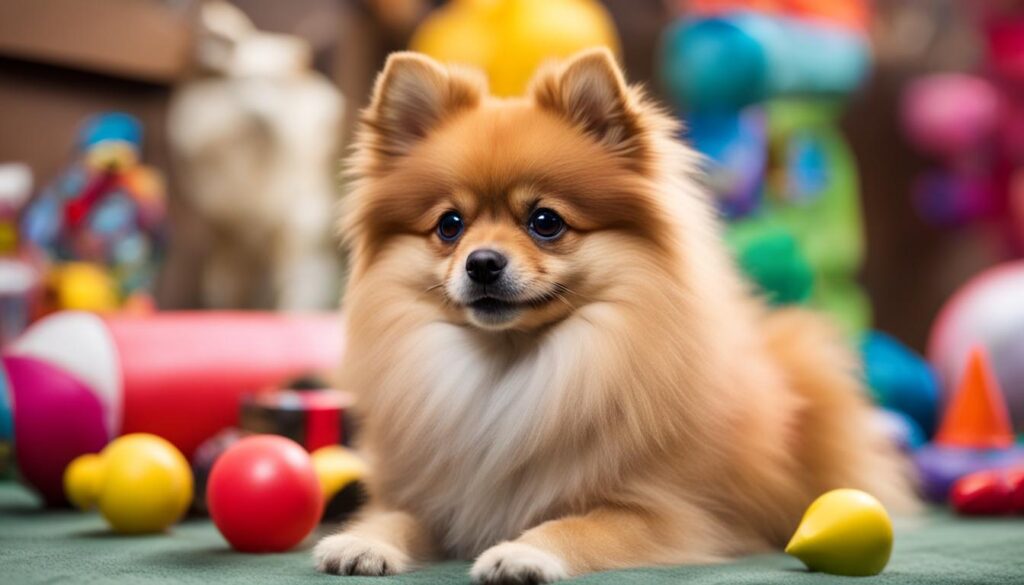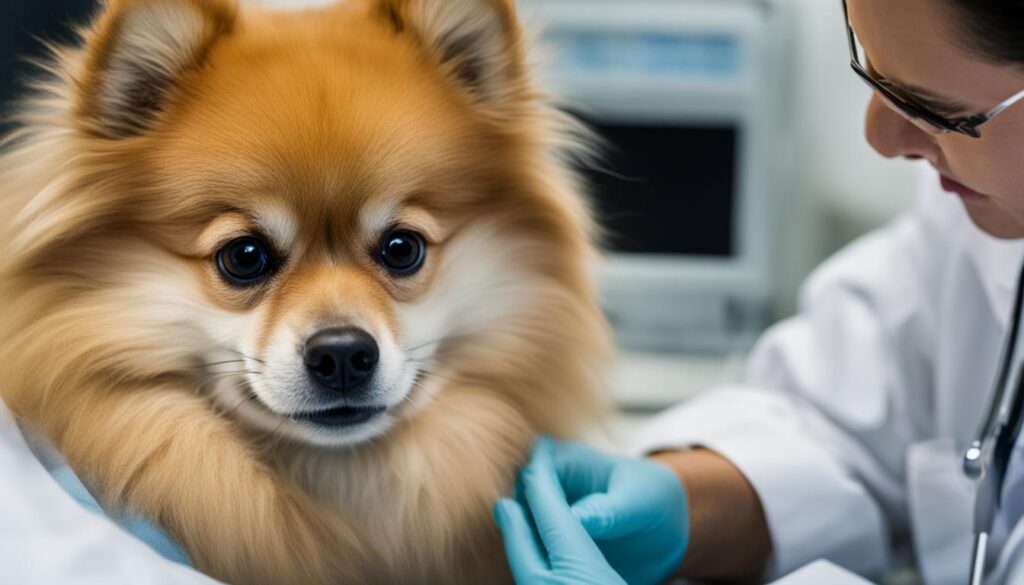Pomeranians are known for their unique temperament and charming personality. As a proud Pomeranian owner, I have witnessed firsthand the delightful traits and behavior that make this breed so special. In this guide, I will share valuable information about Pomeranian temperament, behavior, characteristics, and more. Whether you’re a prospective owner or already have a Pomeranian companion, this guide will provide you with essential insights to understand and care for these adorable dogs.
Key Takeaways:
- Pomeranians have a loyal and playful temperament, making them great companions for families.
- Their small size makes them suitable for city dwellers with limited living space.
- Pomeranians have a distinctive foxy face, round head, and perky ears.
- They have a dense double coat that comes in various colors.
- Pomeranians are intelligent and can be trained for obedience and agility.
Pomeranian Breed History
Let me take you back to the origins of the adorable Pomeranian breed. These small, fluffy dogs have a fascinating history that dates back to the province of Pomerania, which is now part of Germany and Poland. Pomeranians are descendants of sled dogs from Lapland and Iceland, belonging to the Spitz family of dogs.
It was during the reign of Queen Victoria that Pomeranians gained significant popularity. The Queen herself was fond of the breed and played a crucial role in breeding them down to a smaller size. With her influence and dedication, Pomeranians transformed from larger sled dogs to the compact and adorable companions we know today.
The American Kennel Club officially recognized the Pomeranian breed in 1888, and since then, they have become one of the most beloved and sought-after dog breeds in the United States. Their charming personalities and lovable nature have won the hearts of dog lovers everywhere.
Evolution and Development
Over the years, Pomeranians went through a remarkable evolution and development. From their origins as working sled dogs, they transformed into cherished companions and show dogs. The breeding efforts, especially during Queen Victoria’s time, played a pivotal role in shaping their appearance and temperament.
Today, Pomeranians are known for their small size, foxy faces, round heads, perky ears, and fluffy tails curled over their backs. They come in a wide range of coat colors, including red, black, white, cream, blue, and many more. Despite their diminutive size, Pomeranians possess a big personality and a whole lot of love to give to their human families.
Stay tuned for the next section, where we’ll dive into the unique characteristics that make Pomeranians such cherished companions.
Pomeranian Characteristics
When it comes to Pomeranians, their unique characteristics make them stand out in the world of dog breeds. These small dogs have a lot to offer, from their size and appearance to their coat colors and overall charm.
Pomeranians are known for their petite size, weighing between three and seven pounds and measuring eight to eleven inches in height. Despite their small stature, they possess a strikingly foxy face, round head, and perky ears that add to their adorable appeal.
One of the most notable features of Pomeranians is their luscious double coat. This dense fur comes in a wide range of colors, including red, black, white, cream, blue, and many more. Their fluffy tail, which is often curled over their back, adds an extra touch of cuteness to their appearance.
Size
Pomeranians are small dogs, weighing between three and seven pounds and standing at eight to eleven inches in height. Despite their small size, they make up for it with their big personalities and loving nature.
Coat Colors
Pomeranians have a diverse range of coat colors, making them a visually stunning breed. From bold reds and rich blacks to delicate creams and striking blues, there is a Pomeranian coat color to suit every preference. Whether you prefer a vibrant and eye-catching companion or a more subdued and elegant pet, Pomeranians have it all.
Pomeranian Temperament and Personality
Pomeranians are known for their cheerful and friendly temperament, making them delightful companions. As an owner of a Pomeranian, I can attest to their lively and affectionate nature. They are always ready to play and show unconditional love to their owners.
These small dogs possess a sense of alertness and make excellent watchdogs. In fact, according to the American Temperament Test Society, a remarkable 77.80% of tested Pomeranians passed the Temperament Test, showcasing their intelligence and adaptability. However, due to their small size, they may display some territorial behavior and bark at larger dogs as a way of protecting themselves.
Pomeranians generally get along well with children, especially if they are raised together. However, it’s important to note that these dogs can be fragile, so supervision is necessary when they interact with small children. Their playful and intelligent nature makes them quick learners, making them suitable candidates for obedience and agility training. With the right guidance and positive reinforcement, Pomeranians can thrive in various training activities.
Pomeranian Traits
In addition to their friendly temperament, Pomeranians possess a variety of unique traits. These charming dogs have a foxy face with expressive eyes that can melt anyone’s heart. Their small size, standing at just eight to 11 inches in height, makes them well-suited for city living and apartments. Pomeranians also have a double coat that comes in various colors, adding to their adorable appearance. Their fluffy tail, which is curled up over their back, is a distinctive feature that highlights their spunky personality.

Pomeranians are truly a joy to have as pets. Their loving nature, intelligence, and unique traits make them wonderful companions for individuals and families alike. With proper care, training, and socialization, they can bring happiness and warmth to any household.
Pomeranian Lifespan
Pomeranians have an average lifespan of 12 to 16 years, making them a long-lived breed. With proper care, diet, exercise, and regular veterinary check-ups, you can help ensure that your Pomeranian lives a healthy and happy life for many years.
Regular veterinary check-ups are important for monitoring your Pomeranian’s overall health and catching any potential health issues early on. Your veterinarian can provide guidance on vaccinations, parasite prevention, and dental care to keep your Pomeranian in optimal health.
Additionally, providing a balanced diet that meets your Pomeranian’s nutritional needs is crucial for their longevity. Feeding them high-quality dog food and monitoring their calorie intake can help prevent obesity and associated health problems.
Exercise is also key to maintaining your Pomeranian’s physical and mental well-being. While they don’t require intense exercise, daily walks and active playtime can help keep them fit and stimulated. Remember to always supervise your Pomeranian when outdoors to ensure their safety.
Pomeranian Lifespan and Quality of Life
By prioritizing your Pomeranian’s health and well-being, you can enhance their lifespan and improve their quality of life. Providing them with love, attention, mental stimulation, and a safe environment will contribute to their overall happiness and longevity.
Pomeranian Care Tips
Providing proper care for your Pomeranian is essential to ensure their overall well-being and happiness. These adorable pups require a balanced diet, regular exercise, and appropriate grooming to keep them healthy and thriving.
Diet and Nutrition
Feeding your Pomeranian a high-quality dog food in small portions is important for their nutritional needs. Keep an eye on their calorie intake to prevent weight gain, as Pomeranians can be prone to obesity. Consult with your veterinarian to determine the right amount and frequency of feeding that suits your Pomeranian’s age, weight, and activity level.
Exercise and Mental Stimulation
Although Pomeranians are small in size, they still need regular exercise to keep them physically and mentally stimulated. Take them for daily walks or engage in active play sessions to keep their energy levels in check. Pomeranians are intelligent dogs, so incorporating training and mental games into their exercise routine is beneficial for their overall well-being.
Grooming and Coat Care
Pomeranians have a beautiful double coat that requires regular grooming to keep it healthy and tangle-free. Brush their coat at least a few times a week to prevent mats and remove loose hair. Additionally, trim their nails regularly and brush their teeth to maintain good oral hygiene. Consider scheduling professional grooming sessions every four to six weeks for a complete grooming package, including bathing and addressing any specific coat care needs.
By following these Pomeranian care tips, you can ensure that your furry companion is happy, healthy, and thriving. Remember to consult with your veterinarian for personalized advice and guidance to meet the specific needs of your Pomeranian.
Pomeranian Training and Exercise
When it comes to Pomeranian training, patience and consistency are key. These intelligent little dogs can be stubborn at times, but with the right approach, they can learn an impressive array of tricks and commands. Positive reinforcement methods, such as treats and praise, work best for motivating Pomeranians.
Regular exercise is essential for the physical and mental well-being of Pomeranians. While they don’t require intense exercise like some larger breeds, they still need daily walks and active playtime to keep them happy and healthy. A tired Pomeranian is a well-behaved Pomeranian, so be sure to provide them with plenty of opportunities to burn off excess energy.
When engaging in physical activities with your Pomeranian, it’s important to consider their small size and fragile nature. Avoid activities that could put too much strain on their joints or result in injury. Instead, opt for low-impact exercises like short walks, gentle play sessions, and interactive toys that stimulate their mind.
Training Tips for Pomeranians
Here are some training tips specifically tailored for Pomeranians:
- Start training early: Begin training your Pomeranian as soon as you bring them home. Early socialization and basic obedience training can help them grow into a well-behaved adult dog.
- Keep training sessions short: Pomeranians have short attention spans, so keep training sessions brief and engaging. Aim for multiple short sessions throughout the day rather than one long session.
- Be consistent: Pomeranians thrive on routine and consistency. Use the same cues and commands consistently, and reward them for good behavior every time.
- Use positive reinforcement: Pomeranians respond best to positive reinforcement methods, such as treats, praise, and play. Focus on rewarding desired behaviors rather than punishing unwanted ones.
- Be patient: Training a Pomeranian takes time and patience. Don’t get discouraged if progress is slow, and be prepared to adapt your training methods to suit their individual needs.
By providing your Pomeranian with proper training and exercise, you can help them develop into well-rounded, happy companions. Remember, every dog is unique, so don’t be afraid to tailor your training approach to suit their individual personality and learning style.
Pomeranian Diet and Nutrition
Proper diet and nutrition play a crucial role in the overall health and well-being of your Pomeranian. Providing your furry friend with a balanced and nutritious diet is essential to keeping them happy and healthy. Here are some important considerations when it comes to feeding your Pomeranian.
Dietary Requirements
Pomeranians have specific dietary needs due to their small size and energetic nature. It’s important to choose a high-quality dog food that is appropriate for their age, weight, and activity level. Look for dog food specifically formulated for small breeds to ensure that it meets their nutritional requirements.
When feeding your Pomeranian, it’s important to monitor their calorie intake to prevent overeating and weight gain. Pomeranians can be prone to obesity, which can lead to a range of health issues. Divide their daily food intake into multiple small meals to help regulate their metabolism and prevent overeating.
Feeding Tips
When it comes to feeding your Pomeranian, consistency is key. Stick to a regular feeding schedule and avoid giving them table scraps or unhealthy treats. Pomeranians have sensitive stomachs and can be prone to digestive problems, so it’s best to stick to their regular dog food.
Always provide fresh water for your Pomeranian and make sure their food and water bowls are clean. Pay attention to any changes in appetite, weight, or digestion, as these could be signs of an underlying health issue. If you have any concerns about your Pomeranian’s diet or nutrition, consult with your veterinarian for personalized advice.
Pomeranian Grooming Requirements
Grooming is an essential part of caring for your Pomeranian. Their thick double coat requires regular attention to keep it healthy and looking its best. Proper grooming not only enhances their appearance but also helps to prevent matting and skin issues.
Regular brushing is a must for Pomeranians. Use a slicker brush or a comb with wide-set teeth to gently remove any tangles or loose hair. This not only helps to prevent matting but also stimulates the skin and promotes healthy hair growth.
In addition to brushing, Pomeranians should have their nails trimmed regularly. Long nails can be uncomfortable for your furry friend and may cause difficulty walking or even lead to injury. You can trim their nails yourself or enlist the help of a professional groomer.
Grooming Tools for Pomeranians
When it comes to grooming your Pomeranian, having the right tools is essential. Here are some grooming essentials for your furry friend:
- Slicker brush or comb with wide-set teeth
- Nail clippers or a nail grinder
- Ear cleaner and cotton balls
- Toothbrush and toothpaste formulated for dogs
- Grooming scissors for trimming around the paws and ears
It’s important to use grooming tools specifically designed for dogs to ensure their safety and comfort. Regular grooming sessions also provide an opportunity to check your Pomeranian’s ears, teeth, and overall health. If you’re unsure about any aspect of grooming, consult a professional groomer.
Living with a Pomeranian
Living with a Pomeranian is a delightful experience. These small and lovable dogs make fantastic companions and can adapt well to various living situations. Whether you live in an apartment or a house with a small yard, a Pomeranian can thrive as an indoor pet.
Pomeranians are well-suited for families and individuals alike. They are known for their loyalty, playfulness, and affectionate nature. As a pet owner, you’ll enjoy their lively and friendly temperament, making every day a joyous adventure.
When living with a Pomeranian, it’s important to provide them with proper supervision when outdoors. Although they are small, they have a spirited nature and may try to explore or chase after bigger dogs. Ensuring their safety and preventing any potential accidents should be a priority. Additionally, regular exercise, such as walks and active playtime, is crucial for their physical and mental well-being.
Common Pomeranian Health Problems
When it comes to the health of your beloved Pomeranian, it’s important to be aware of common health problems that can affect this breed. While Pomeranians are generally healthy dogs, they do have a predisposition to certain conditions that owners should be mindful of.
One common health issue in Pomeranians is hip dysplasia, which is a condition where the hip joint doesn’t develop properly. This can lead to pain, lameness, and difficulty in moving. Another common problem is luxating patella, which occurs when the kneecap dislocates or moves out of its normal position. Pomeranians may also be prone to tracheal collapse, a condition where the windpipe becomes weak and collapses, causing coughing and difficulty in breathing.
Pomeranians are also susceptible to various eye problems, including cataracts, dry eye, and progressive retinal atrophy. Dental health is another area of concern, as Pomeranians are prone to periodontal disease, which can lead to tooth loss and other health complications. Additionally, Pomeranians are known to have allergies and may experience itching, skin irritations, and digestive issues as a result. Thyroid disease is another condition that can affect Pomeranians, leading to weight gain, hair loss, and lethargy.

Preventive Care for a Healthy Pomeranian
While these health problems can be concerning, there are steps you can take to help prevent and manage them. Regular veterinary check-ups are essential for early detection and treatment of any potential health issues. It’s also important to provide your Pomeranian with a well-balanced diet, regular exercise, and proper grooming to support their overall health.
Ensuring your Pomeranian receives appropriate dental care, such as regular teeth brushing and professional cleanings, can help prevent periodontal disease. Keeping their weight in check and providing them with a diet suitable for their age and activity level can also contribute to their overall well-being. Regular exercise, such as daily walks or playtime, helps to keep Pomeranians physically and mentally stimulated.
By being proactive in your Pomeranian’s healthcare and providing them with a loving and nurturing environment, you can help them lead a happy and healthy life. Remember, prevention and early intervention are key when it comes to managing common health problems in Pomeranians.
Conclusion
In conclusion, understanding the temperament and characteristics of Pomeranians is crucial for providing them with the proper care and ensuring a happy and healthy life. These loyal, playful, and affectionate dogs make great companions for families and individuals alike. Whether you live in an apartment or have a small yard, Pomeranians can adapt well to various living situations.
With the right training, Pomeranians can become obedient and well-behaved pets. Regular exercise, such as walks and active playtime, is important for their physical and mental stimulation. A balanced diet, monitored calorie intake, and high-quality dog food are essential for their nutritional needs. Additionally, regular grooming, including brushing their thick double coat, trimming their nails, and cleaning their teeth, is necessary to maintain their overall health and well-being.
Last but not least, regular veterinary check-ups and preventive care are vital for identifying and managing any potential health issues that Pomeranians may be prone to. By providing proper care, Pomeranians can bring immense joy and love to their owners for many years to come. So, if you’re considering adding a Pomeranian to your family, rest assured that with the right care, they will be a delightful addition to your life.
FAQ
What is the temperament of Pomeranians?
Pomeranians are cheerful and friendly dogs, known for their loyalty and playfulness. They are alert and make good watchdogs, but may bark at larger dogs. They generally get along well with children if raised with them, but should be supervised around small children due to their fragility.
What is the history of the Pomeranian breed?
Pomeranians were developed in the province of Pomerania (now Germany and Poland) and are descendants of sled dogs from Lapland and Iceland. They gained popularity during the reign of Queen Victoria, who helped breed them down to a smaller size. Pomeranians were officially recognized by the American Kennel Club in 1888 and are now one of the most popular dog breeds in the United States.
What are the characteristics of Pomeranians?
Pomeranians are small dogs, weighing between three and seven pounds and standing at eight to 11 inches in height. They have a foxy face, round head, perky ears, and a fluffy curled-up tail. Their double coat comes in a variety of colors. They are the smallest member of the Spitz family of dogs.
What is the average lifespan of a Pomeranian?
The average lifespan of a Pomeranian is between 12 and 16 years, but with proper care, diet, exercise, and regular veterinary check-ups, they can live even longer.
What care requirements do Pomeranians have?
Pomeranians require a balanced diet, regular exercise, and proper grooming. They should be fed small amounts of high-quality dog food, monitored to prevent weight gain. Regular brushing, nail trimming, and teeth brushing are important for their coat and overall health.
How should I train and exercise my Pomeranian?
Pomeranians are intelligent dogs and enjoy learning tricks and performing. They require regular walks and active playtime for their physical and mental stimulation. Training should be done with patience and consistency, as Pomeranians can be stubborn at times.
What should I feed my Pomeranian?
Pomeranians require a balanced diet that is appropriate for their age, weight, and activity level. Feeding them small portions of high-quality dog food is recommended. Monitoring their calorie intake and ensuring they receive the necessary nutrients is important, as some Pomeranians can be picky eaters.
How should I groom my Pomeranian?
Pomeranians have a thick double coat that requires regular brushing to prevent matting. Their nails should be trimmed and teeth brushed regularly. Professional grooming every four to six weeks may be necessary for full grooming, including bathing and checking ears and anal glands.
Can Pomeranians adapt to different living situations?
Pomeranians can adapt well to various living situations, including apartments and homes with small yards. They are well-suited for families and can thrive as indoor pets. However, they should be supervised when outdoors to prevent escape or injury by larger dogs.
What are common health problems in Pomeranians?
Pomeranians are generally healthy dogs, but they can be prone to certain health conditions such as hip dysplasia, tracheal collapse, eye problems, periodontal disease, allergies, and thyroid disease. Regular veterinary check-ups and preventive care are important for identifying and managing these health issues.



